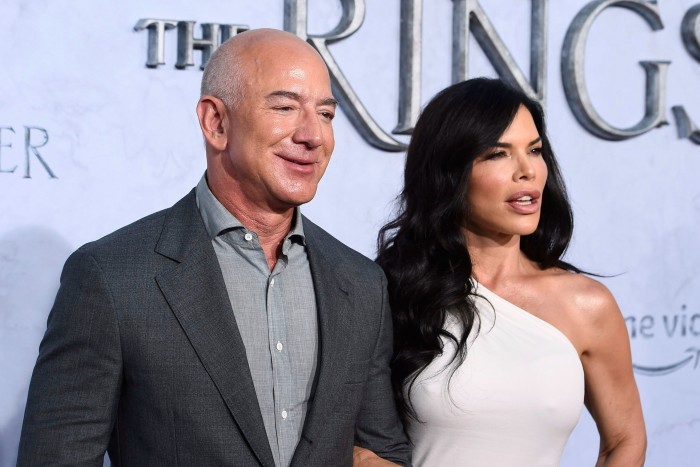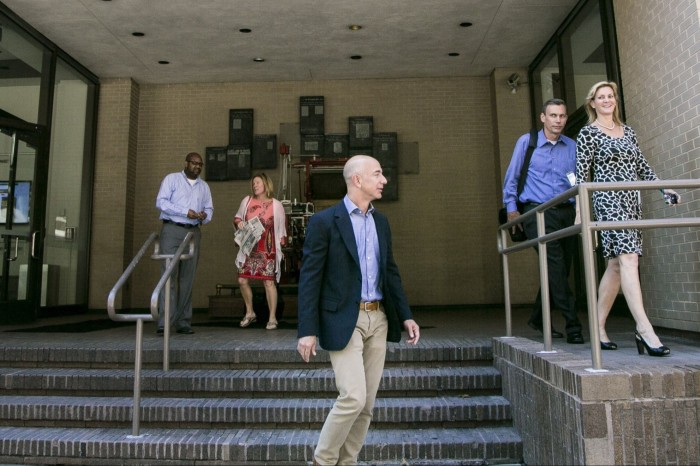Three years after Jeff Bezos bought the Washington Post for $250 million, the Amazon billionaire made another acquisition in Washington that was arguably just as significant for Georgetown’s social class: a mansion in the capital’s upscale Kalorama Heights neighborhood for $23 million.
His 2016 purchase of a former textile museum that would become the city’s largest private residence was celebrated locally as a sign that the tech titan and his then-wife MacKenzie were moving their lives from Seattle – where the couple had a love-hate relationship with the city’s grandees – to “the other Washington.”
Bezos did nothing to quell the speculation. Just as he began a $12 million renovation of the house in 2018, Amazon announced plans to build a second headquarters in the Washington suburb of Crystal City. Then it was revealed that he wanted to take over the city’s famous national football team, which would soon change its name from the Redskins to the Commanders.
The capital welcomed its new arrival. “He will revive the legacy of Kay Graham and her great conviviality,” Jean Case, a friend of Bezos and wife of AOL co-founder Steve Case, predicted this year, referring to the late, legendary post-office owner and Georgetown hostess.
When Bezos threw his first big party at the Kalorama estate in January 2020, guests included Mitt Romney and Ivanka Trump, and the Post, whose digital subscriptions and staff numbers soared, seemed a rare growth story in the news industry. Soon after, its owner also began building his $10 billion charity, the Bezos Earth Fund, in Washington.
But over the past 18 months, several of Bezos’s major investments in Washington have been derailed, blocked or overtaken by events – culminating in the turmoil at the Washington Post, where the billionaire’s hand-picked chief executive, Sir Will Lewis, is facing a newsroom revolt sparked by his radical attempts to stem the news organization’s losses, which reached $77 million last year.
Robert Winnett, the former British colleague whom Lewis appointed as editor, resigned from his post last week after articles appeared in rival media and in the Post itself questioning the ethics of both men in previous positions.
The series of setbacks raises a question in the capital: Is Bezos still as in love with Washington – and with the Washington Post – as he was a decade ago when he took over the struggling newspaper?
People who have spoken to Bezos insist he is committed to the Washington Post for the long term, a view he reiterated in a memo to editors last week in which he signaled he would “lead this great institution into the future.”
“In my experience, Jeff is a tough guy and I don’t think he cares all that much about what people think,” said one person who has worked closely with him in the past. “Will he tolerate losing $100 million every year? Absolutely not. Is he willing to give Will a chance to execute his strategy? I’m confident he will, unless new negative revelations come to light.”
Nevertheless, a look at Bezos’ recent activities paints a somewhat different picture of the priorities of the tech billionaire and his new partner, TV personality Lauren Sánchez: Other political centers are competing with Washington for business and social goals.
Flight logs for three private jets linked to Bezos, provided by JetSpy, do not capture all of the couple’s recent trips to Washington, where they hosted an awards gala in March and attended a state dinner at the White House in April, but they suggest that the city has ranked behind Seattle, California, Florida and Texas on their list of travel destinations since early 2021.
As the Post celebrated its three Pulitzer Prizes in May, the couple attended the glitzy Met Gala in Manhattan. Bezos arrived after attending an equally high-profile Formula One Grand Prix party in Miami. And as the Post’s leadership crisis rocked last week, they were photographed vacationing in Mykonos.
Days after Lewis shocked Post journalists this month by announcing the resignation of editor Sally Buzbee, Bezos paid $87 million for a third waterfront property in Miami: a 10,000-square-foot mansion on an 800,000-square-foot lot with seven bedrooms, a pool and a boat dock.
His move to South Florida followed Amazon’s announcement last year that it would halt construction on its Crystal City headquarters. Holly Sullivan, Amazon’s vice president of worldwide economic development, stressed that “our long-term commitment remains unchanged” but acknowledged that there was no update on when construction would resume.
Amazon had promised to create 25,000 jobs at the site, which is located next to Washington’s Reagan National Airport and across the Potomac River from the capital’s monuments and museums.
But recent data from the Virginia State Development Authority shows that the number of Amazon employees in the region has actually fallen to 7,791 from 8,430 last year. The Post was the first to report the decline. Amazon, which like other major tech companies is grappling with how much office space it will need after the pandemic, told the Financial Times that about 8,000 employees have been assigned to the HQ2 site and that more than 1,000 positions are open.

Of all of Bezos’s thwarted Washington initiatives, the one that may haunt him most is his failed pursuit of the Commanders. A lifelong NFL fan, Bezos had repeatedly expressed his desire to join the elite club of football team owners.
Bezos even went so far as to put together an ownership group with music mogul Jay-Z to acquire the Commanders, but was outbid by fellow billionaire Josh Harris, co-founder of private equity firm Apollo.
Some US media reported at the time that the team’s then-owner, Dan Snyder, blocked Bezos’ offer on the grounds that he owned the Washington Post. Snyder was thus virtually single-handedly forced to sell after it emerged that the team allegedly tolerated widespread sexual harassment and mistreatment of employees.

But people familiar with the process insist Bezos was simply outbid by Harris, who acquired the team for $6 billion. “I don’t think Snyder would have not sold them if Jeff had come in with a $7 billion bid,” said one person involved in the process.
There is little evidence that Bezos dislikes the Post, the original pillar of his Washington empire, or Lewis, the boss he chose to transform it.
When the group was looking for a new chief executive and publisher last year, Bezos relied heavily on his longtime friend and Amazon board member Patty Stonesifer, who served as the Post’s interim chief, to select candidates. The Post hired the consulting firm Sucherman to help with the process and conducted a “thorough background check” on Lewis and his past, according to people familiar with the matter. But the final decision to hire Lewis is said to have been made by Bezos himself over a meal with the British media executive.
People familiar with the matter say Bezos and Lewis have had a good relationship – at least until now – and that Bezos has supported Lewis’s turnaround plan for the Post, which has lost nearly half its readership since 2020.
Bezos has so far moved “in lockstep” with Lewis’ decisions, according to a person familiar with their relationship. The Amazon founder has approved his new CEO’s decisions before they were announced, including the plan for a “three-editorial” structure that led to Buzbee’s departure, they added.
But Bezos is unemotional about parting ways with executives he has historically disliked. When he decided to fire Katharine Weymouth as publisher of the Post in 2014, he acted quickly. Less than a year after buying the paper, he fired the heiress of the Graham family, which had controlled the paper for eight decades, in a single meeting that lasted less than five minutes.
“I was shocked by the abrupt and icy dismissal,” Martin Baron, the editor-in-chief at the time, wrote in a recent book. Weymouth later said, “I simply expected to at least finish this year.”
Additional reporting by Daniel Thomas and James Fontanella-Khan